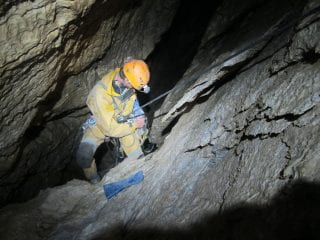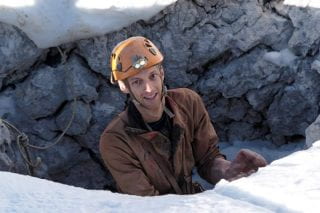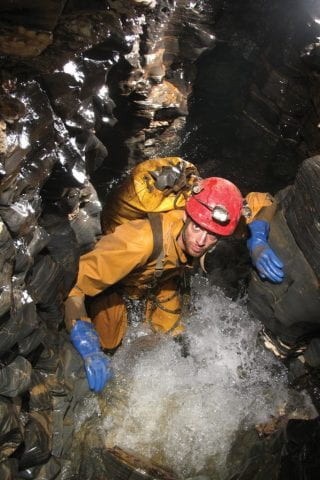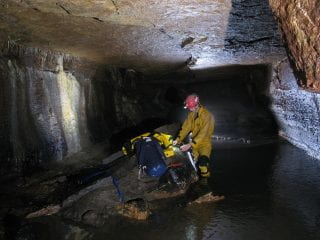Geosciences’ Matt Covington Receives 2019-20 U.S. Fulbright Scholar Award
Matt Covington, an associate professor in the Department of Geosciences at the University of Arkansas, recently received a 2019-20 U.S. Fulbright Scholar Award to continue his research in Slovenia on the impact of cave ventilation on the rates and patterns of cave development.
While there, he will be developing models for cave airflow to better understand how the exchange of CO2 impacts the development of caves.
“As a Fulbright Scholar, I’ll be traveling to Slovenia to work with my colleague Franci Gabrovšek at the Karst Research Institute on this project,” Covington said. “We hope to synthesize a new model to study the relationships among CO2 dynamics, cave ventilation and cave evolution.”

Exploring a newly discovered deep vertical cave in the Julian Alps of Slovenia. Photo by Will Heltsley.
Covington said that this new model could ultimately help researchers better understand how pollutants move through the subsurface in karst aquifers, which contain caves.
Roughly 20 percent of the world’s population depends on water from karst aquifers, Covington said. Karst is a type of terrain and hydrogeologic setting that develops in locations where the bedrock is easily dissolved, like in parts of Arkansas and especially in Slovenia.
In fact, the term karst itself derives from the Kras region of Slovenia, which is known as the “classical karst.”

Emerging from a cave entrance high in the Julian Alps after a 5-day trip to dive in the bottom of the cave, which is over 1000 meters deep. Photo by Primož Rupnik.
“While spectacular landscapes and caves often form on karst terrain, karst also introduces particular water quality problems and natural hazards,” Covington said. “Difficulties for water quality management arise because caves can carry pollutants rapidly through the subsurface with little time for degradation or filtration.”
Covington said other challenges include how difficult it is to determine the direction and speed of transport of these contaminants, and that infrastructure within karst terrains is also subject to hazards like sinkhole collapses and flooding.
“The more we know about the structure of caves systems that will develop in a karst setting, the better we can manage water quality and natural hazards,” Covington said.
Covington’s background has uniquely prepared him for this opportunity. He has a Ph.D. in theoretical astrophysics from the University of California – Santa Cruz, and undergraduate degrees in both physics and philosophy. While pursuing these studies, he lived a parallel life as an expedition caver, exploring and mapping in some of the deepest caves in the world.
These expeditions took him to Mexico, Peru, Sumatra, Alaska, China, Slovenia, Croatia and other far-flung places. Then, in the final year of his Ph.D. studies, Covington’s career took a dramatic shift as he decided to pursue research in geoscience, combining his passion for caves with his skill set in mathematical modeling.
“I realized that I could pursue a scientific career that combined both,” Covington said. “This was in part inspired by discovering that Dr. Gabrovšek, and several other leading cave and karst scientists, also had backgrounds in physics.”
Upon completion of his Ph.D., Covington began his first postdoc studying karst hydrology at the University of Minnesota supported by an NSF Earth Sciences Postdoctoral Fellowship. He also spent two years as an NSF International Research Fellow working at the Karst Research Institute in Slovenia before returning to the University of Arkansas in 2012 as an assistant professor in the Department of Geosciences.
While much of Covington’s work involves mathematical modeling of geological processes, he also spends substantial time in the field.
“This project, like most of my work, combines elements of mathematical modeling and analysis of field data,” Covington said. “We’re very excited about it and the implications our findings could have.”
About the Fulbright Program: The Fulbright Program is the U.S. government’s flagship international educational exchange program and is designed to build lasting connections between the people of the United States and the people of other countries. The Fulbright Progr am is funded through an annual appropriation made by the U.S. Congress to the U.S. Department of State. Since the program was established in 1946 under legislation introduced by then-U.S. Sen. J. William Fulbright of Arkansas, the Fulbright Program has given more than 390,000 students, scholars, teachers, artists, and professionals of all backgrounds and fields the opportunity to study, teach and conduct research, exchange ideas, and contribute to finding solutions to shared international concerns. Fulbrighters have achieved distinction in many fields, including 59 who have been awarded the Nobel Prize, 84 who have received Pulitzer Prizes, and 37 who have served as a head of state or government.
Andra Parrish Liwag
Director of Communications, J. William Fulbright College of Arts and Sciences
479-575-4393 // liwag@uark.edu




